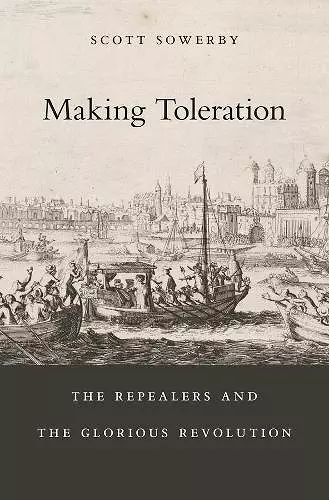Making Toleration
The Repealers and the Glorious Revolution
Format:Hardback
Publisher:Harvard University Press
Published:31st Mar '13
Currently unavailable, and unfortunately no date known when it will be back

A sophisticated account of a much-neglected chapter in England's history. Sowerby reshapes our perceptions of both the Glorious Revolution and religious toleration in early modern Europe. Moreover, this book will greatly expand our understanding of the intellectual range and political impact of the early Enlightenment. -- Brian Cowan, McGill University
Though James II is often depicted as a Catholic despot who imposed his faith, Scott Sowerby reveals a king ahead of his time who pressed for religious toleration at the expense of his throne. The Glorious Revolution was in fact a conservative counter-revolution against the movement for enlightened reform that James himself encouraged and sustained.
In the reign of James II, minority groups from across the religious spectrum, led by the Quaker William Penn, rallied together under the Catholic King James in an effort to bring religious toleration to England. Known as repealers, these reformers aimed to convince Parliament to repeal laws that penalized worshippers who failed to conform to the doctrines of the Church of England. Although the movement was destroyed by the Glorious Revolution, it profoundly influenced the post-revolutionary settlement, helping to develop the ideals of tolerance that would define the European Enlightenment.
Based on a rich array of newly discovered archival sources, Scott Sowerby’s groundbreaking history rescues the repealers from undeserved obscurity, telling the forgotten story of men and women who stood up for their beliefs at a formative moment in British history. By restoring the repealer movement to its rightful prominence, Making Toleration also overturns traditional interpretations of King James II’s reign and the origins of the Glorious Revolution. Though often depicted as a despot who sought to impose his own Catholic faith on a Protestant people, James is revealed as a man ahead of his time, a king who pressed for religious toleration at the expense of his throne. The Glorious Revolution, Sowerby finds, was not primarily a crisis provoked by political repression. It was, in fact, a conservative counter-revolution against the movement for enlightened reform that James himself encouraged and sustained.
Scott Sowerby's able and important work, drawn from an impressive array of primary sources, tells a story quite different from the conventional, but still repeated, version of [James II's] short reign. Sowerby's is a James who tried to build consensus and was met by disaffected individuals who manufactured a sense of grievance; a James who was not vindictive, and, seeking reconciliation, often stopped short of counter-measures he might have taken. It was James, not William of Orange, who constructed a reform movement: the attempt to repeal the Test and Corporation Acts and to build a religiously plural society. -- Jonathan Clark * Times Literary Supplement *
On the strength of this excellent book we can conclude that [James II] was far more intelligent than is usually supposed and we are reminded that he emptied more prison cells than he filled. As for the 'Repealers' of the book's sub-title, Sowerby provides an extraordinarily detailed portrait of this plucky band of religious dissenters who recognized that history might finally be on their side. It should also be mentioned that the extent of Sowerby's archival wanderings--he visited no fewer than 138 manuscript depositories--is phenomenal. -- Jonathan Wright * Catholic Herald *
This clearly written, impressively researched book turns traditional interpretations of the rise of religious toleration and the reign of James II on their heads. Sowerby reconstructs the repealer movement from a variety of printed and archival sources, demonstrating that the Glorious Revolution of 1688 was, in fact, a counter-revolutionary movement opposing the political movement for toleration of nonconformists that James himself sponsored... [Sowerby's] analysis of James's attempts to shape popular opinion casts doubt on views of James as merely a failed absolutist monarch out of touch with his people. The book will interest students and scholars of British politics, religious toleration, and pluralism, and the relationship between memory and the writing of history. -- J. W. McCormack * Choice *
A sophisticated account of a much-neglected chapter in English history. Sowerby reshapes our perceptions of both the Glorious Revolution and religious toleration in early modern Europe. Moreover, this book will greatly expand our understanding of the intellectual range and political impact of the early Enlightenment. -- Brian Cowan, McGill University
One of the lasting consequences of the Glorious Revolution in England was the Toleration Act of 1689, which granted freedom of worship, but not full political rights, to almost all Protestant Dissenters, but not Roman Catholics. It is generally recognized that this Act was Parliament's response to James II's campaign to secure toleration and political rights for both Dissenters and Catholics by repealing the penal laws and Test Acts. This important new book, by a talented young historian, systematically examines the supporters of repeal and argues that their importance, and their significance in the Revolution, have been underestimated. -- John Miller, Queen Mary, University of London
Bold and provocative…[Sowerby] regards the repealers and their ideas as precursors to the Enlightenment, with its concern for religious toleration and freedom of conscience. The undoubted achievement of Sowerby’s research is to demonstrate that the repealers’ cause was buttressed by a well-thought-out set of religious and political points. -- Jeremy Gregory * Church Times *
- Nominated for Morris D. Forkosch Prize 2014
- Nominated for Herbert Baxter Adams Prize 2014
- Nominated for John Ben Snow Foundation Prize 2014
- Nominated for Best First Book in the History of Religions Award 2014
- Nominated for Award for Excellence in the Study of Religion 2014
ISBN: 9780674073098
Dimensions: 235mm x 156mm x 34mm
Weight: 794g
416 pages